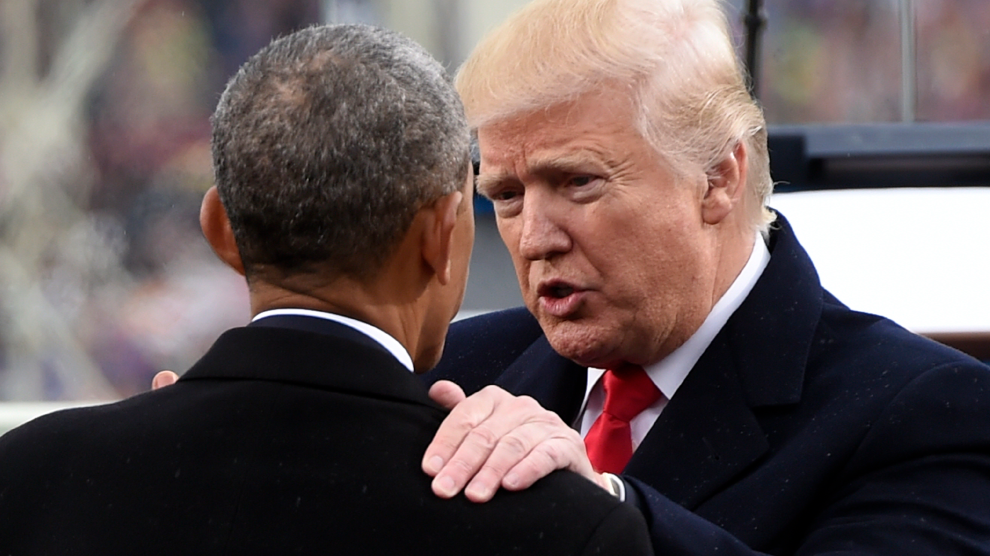There are moments when you can tell what they will feel like in retrospect: hitting bottom, a dam cracking. Between Michael Cohen’s guilty plea, Paul Manafort’s conviction, a cascade of semi-mutinous signals from inside the White House, and a slew of polls and election results showing the extraordinary civic energy building for the midterms, the last month had that quality.
It felt like truth breaking, if briefly, through the miasma of lies. Like confirmation that the institutions of democracy cannot be bent at will by an authoritarian impulse, or fully paralyzed by its enablers.
But that flicker of truth is not yet a blaze, and fanning it is a matter not just of the next two months, but of the years—decades—ahead. It’s the long game. As President Barack Obama put it recently, confronting his successor by name for the first time: “He is a symptom, not the cause.”
The long game requires us to understand how our habits help liars succeed, and that’s particularly important for journalists. Because while the last two years have brought some shining moments for our profession, they’ve also highlighted some of its persistent failures. We can’t afford to keep making the same mistakes as we head toward what could be our last, best shot at revitalizing our democracy.
One of the most insidious of these mistakes is clinging to what press critic Jay Rosen has called the “View From Nowhere”—casting each story, especially in politics, as a contest of partisan extremes, with the journalist’s role reduced to chronicling what each side is saying. “It’s an attempt to secure a kind of universal legitimacy,” Rosen notes, “that is implicitly denied to those who stake out positions or betray a point of view.”
This, of course, is not a view from nowhere—it’s a view from the middle between whatever you define as the two “sides.” When “right” means Steve Bannon and “left” means Nancy Pelosi, that middle is not in the same place as when right is John McCain and left is the Socialist Workers Party.
But the problem is deeper than calibration. It’s about the fact that the View From Nowhere does not allow for a moral compass. There is no right and wrong when you are nowhere. There are just “very fine people on both sides.”
Fair warning: I believe this is a fixable problem, and that Mother Jones’ model of reader-supported, independent journalism is part of how we can fix it in the long run. So I’m going to ask you to commit to the long run with a (tax-deductible!) donation, and particularly with a sustaining gift—to help us show the power of journalism that is fair and accurate and stands for something.
But whether or not you can contribute, I hope you’ll consider the argument, because this is bigger than any one newsroom. It’s about how journalism can make good on its charge to keep a check on power when the rules of power are changing.
The other day I had a long talk with a veteran editor I admire about what he said was Mother Jones’ “bias.” Just admit it, he said, you’re partisan. Otherwise, why would you have so many articles about corruption and malfeasance by Trump and Republicans?
It was around the time that Michael Cohen pleaded guilty and Paul Manafort was convicted, just before the anonymous op-ed warning that the president’s own team is scared of what he might do. So my first thought was, “Seriously?? How could we not throw everything we’ve got at this massive struggle for our democracy?”
But I knew that didn’t quite do justice to his question, and when the full answer finally jelled, it was—isn’t it always?—too late. So I’m going to try to unpack it here.
Our starting point at Mother Jones, I wish I’d said, is not the view from nowhere. Our journalism comes from somewhere. It comes from a passion for justice, fairness, and a democracy where facts matter and all can participate. That’s not a partisan agenda, because these values are bigger than party. But it is a point of view.
Fairness and accuracy are not served by pretending to have no point of view. They are served by acknowledging where you’re coming from and then being rigorous about following the facts where they lead.
Credible science uses the scientific method: Hypothesis, experiment, replicable result. Credible journalism uses the journalistic method: Seek out different points of view. Look for evidence that might contradict your assumptions. If your mother says she loves you, check it out. And, of course, fact-check the hell out of every detail.
This method is hard, frustrating, and incredibly rewarding. Some of our best stories have been those that upended our expectations: Red states like Utah and North Dakota have done some of the most progressive work on homelessness and prison reform. Alcohol is far more dangerous than our lightheartedly boozy culture has acknowledged. Candidates that hard-bitten political reporters didn’t expect to break through… just might.
Following the facts is what distinguishes journalism from the empty-calorie outrage bait that has become pervasive across the political spectrum. Propaganda-slingers from Julian Assange to Alex Jones have claimed the mantle of journalism, without any of the responsibility. Omar Rivero, whose Occupy Democrats Facebook page is a hive of hoaxes, has said he’s “not in the business of arbitrating what is good content.” And conservative sites, some of which once took pride in real muckraking, have lost their best reporters on the road to becoming Trump Dot Com.
So why is the view from nowhere so persistent—even when the past three years have so spectacularly demonstrated its limits? Some of it is historical legacy. The American notion of journalistic objectivity rose partly in response to the virulent partisanship of 19th– and early 20th-century newspapers: Joseph Pulitzer and William Randolph Hearst used their pages to agitate for war, and authoritarian movements across Europe turned the press into an instrument of control.
My father grew up in the Third Reich, watching the Nazis use media to instigate hate and fear. As a teen after the war, he went to journalism school and was captivated by the idea of objectivity, introduced by Americans to inoculate society against demagogues. Journalists, his generation of reporters realized, have a responsibility to resist—and help the public resist—spin and propaganda.
But what became institutionalized in American journalism over the following decades was a more threadbare version of objectivity—a facile he-said-she-said balance. Talking Points Memo’s Josh Marshall has summarized it well:
As an increasing number of American cities became de facto single newspaper towns, their financial footing became increasingly based on monopoly ad pricing. This…made their business model rest on being the default news source for all news consumers in their geographic domain.
Publishers’ profitability depended on appealing to everyone. Betraying a point of view—except on the editorial page—risked offending part of that audience (or the advertisers). So, especially in political reporting, he-said-she-said and “both sides do it” became the dominant storylines. And soon, bad-faith actors realized that by crying bias, you could gain a platform for your talking points, no matter their factual legitimacy. Climate deniers leveraged this habit for years to grab equal time with the scientific consensus. White supremacists have used it to gain a platform in mainstream media.
This is perhaps the biggest danger of the View From Nowhere: It has no defense against manipulation. The only truth you can confidently articulate is that “Person A made Claim B.” Because journalism couldn’t afford to make enemies, it gave up its moral compass. (Side note: This is precisely why reader support means so much to Mother Jones: Because of you, we can afford to make enemies.)
Which brings us, in a roundabout way, to Trump’s lie about the press being the enemy of the people. The truth is, the press is the enemy—of secrecy, corruption, and manipulation. And it should be the enemy of white supremacy and other anti-democratic lies. When one “side” throws out the rule book of democratic norms, both-sides-ism becomes worse than useless; it’s dangerous.
None other than Meet the Press’ Chuck Todd, dean of the view from nowhere, landed on this point in a soul-searching essay in The Atlantic recently:
I’ve seen a nearly 50-year campaign to delegitimize the press, and I’m saying so. For years, I didn’t say a word about this publicly, and at times I even caught myself drawing false equivalencies because I was afraid of being labeled as biased…I’m not advocating for a more activist press in the political sense, but for a more aggressive one. That means having a lower tolerance for talking points, and a greater willingness to speak plain truths. It means not allowing ourselves to be spun, and not giving guests or sources a platform to spin our readers and viewers, even if that angers them.”
We can thank Trump, perhaps, for exposing these legacy fallacies. But Obama is right: Trump did not come out of nowhere. He is capitalizing on trends that have been smoldering for years, and that will persist after he’s gone.
If Trump were a complete anomaly, we wouldn’t have a majority in Congress doing everything in its power to block investigations of a foreign attack on our elections. We wouldn’t see lawmakers refusing to hold hearings on a president’s Supreme Court nominee and then rushing through the next without public access to most of his records. We wouldn’t see officials coddling white supremacists while deploying racist attacks surging in campaigns across the nation.
So here’s what I wish I’d said to the editor grilling me about bias: Journalism needs to start acknowledging, and defending, its values—well beyond the age of Trump. And it won’t lose its power or credibility when it does that. It will grow stronger. Readers already know that each of us has a point of view, and when we pretend otherwise, demagogues fill the void with conspiracy theories about the press.
Why not instead be transparent about who we are and the experiences that shaped us? I’m an immigrant. Others at Mother Jones are who they are because of a public school in Detroit or a family in Mexico or the business success of a grandparent. Our editor-in-chief, Clara Jeffery, has written about growing up with the refugees her family hosted—an experience that left her well equipped to recognize the ugly agenda behind Trump’s immigration rhetoric.
And it’s okay to be biased against racism and white supremacy. We don’t have to pretend these ideas are a necessary part of public debate, as platform chiefs like Twitter’s Jack Dorsey have insisted for too long. We don’t have to elevate them to the pantheon of Big Ideas. What we need to do is explore, accurately and fairly, what people who espouse these beliefs think and why. (For this piece, our writer spent five years listening closely to white conservatives in Louisiana.)
For 42 years, Mother Jones has tried to demonstrate what journalism can look like when it is fair and accurate and stands for something. But we haven’t always talked about why. We’re doing it now because the two most important elections of our lives—2018 and 2020—are ahead, and it’s time to ditch old habits.
So this fall, we are aiming to build the foundation for being able to take a stand and make enemies on a bigger scale. We’re asking our readers to consider signing up as monthly sustaining donors. Our goal is to bring on $30,000 in new, reliable, monthly donations by the time the midterms roll around, allowing us to remain independent and flexible enough to dig into whatever the moment demands.
If you’re with us, I hope you’ll pitch in with whatever makes sense to you. The average monthly gift of our online sustainers is about $14, so if you round that up to $15 you’ll be above average—and we’ll be hugely grateful. If you’re not ready to commit to a monthly gift, one-time donations help a lot too. (We’re a nonprofit, so all your gifts are tax-deductible.) Whether $5 monthly or $5 once, the amount you can pitch in doesn’t matter; what matters is believing in our mission of journalism that is fair and accurate and not afraid to stand for something.
It’s an ambitious goal, and it’s not a safe bet it will work. In the past, our biggest fundraising campaigns have been in response to a particular story or project. This one isn’t as visceral, but it’s vital for the long fight ahead. And our hope is that when we say who we are and why we take a stand, you’ll join us—whether or not the rest of the press is ready to do the same.
Because as we’ve seen these last several weeks, the key to finding truth is persistence.
















